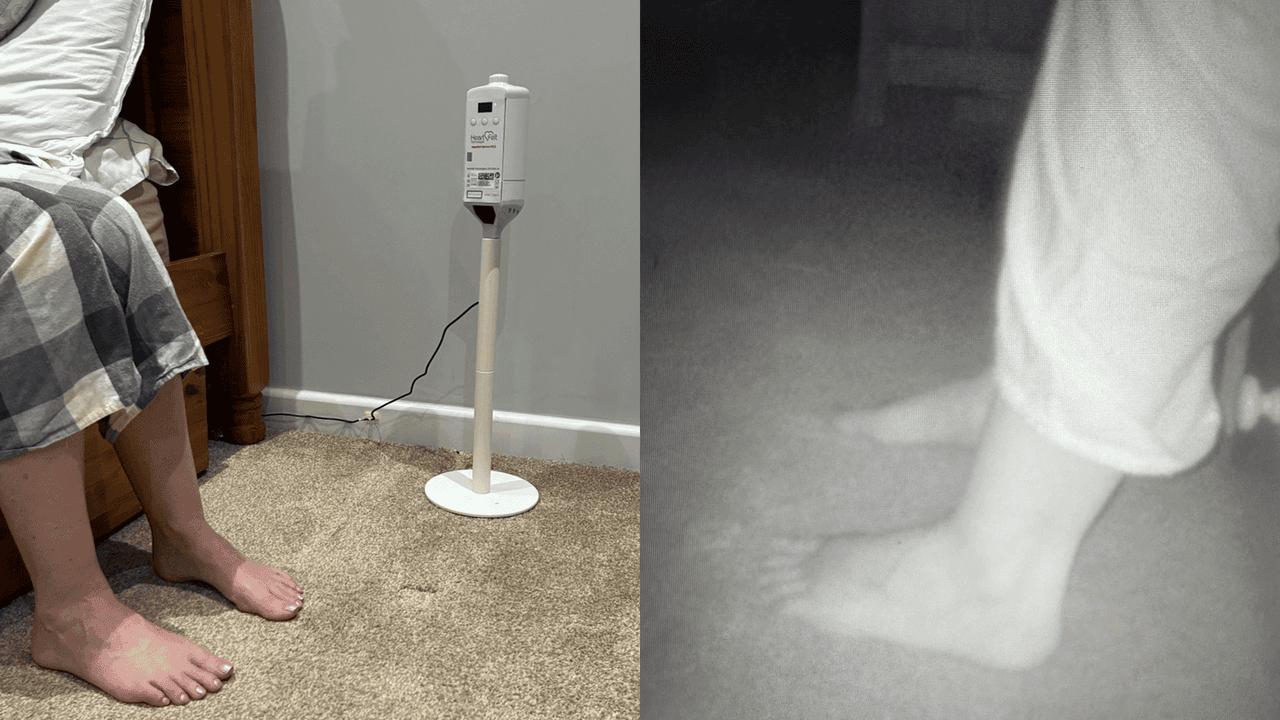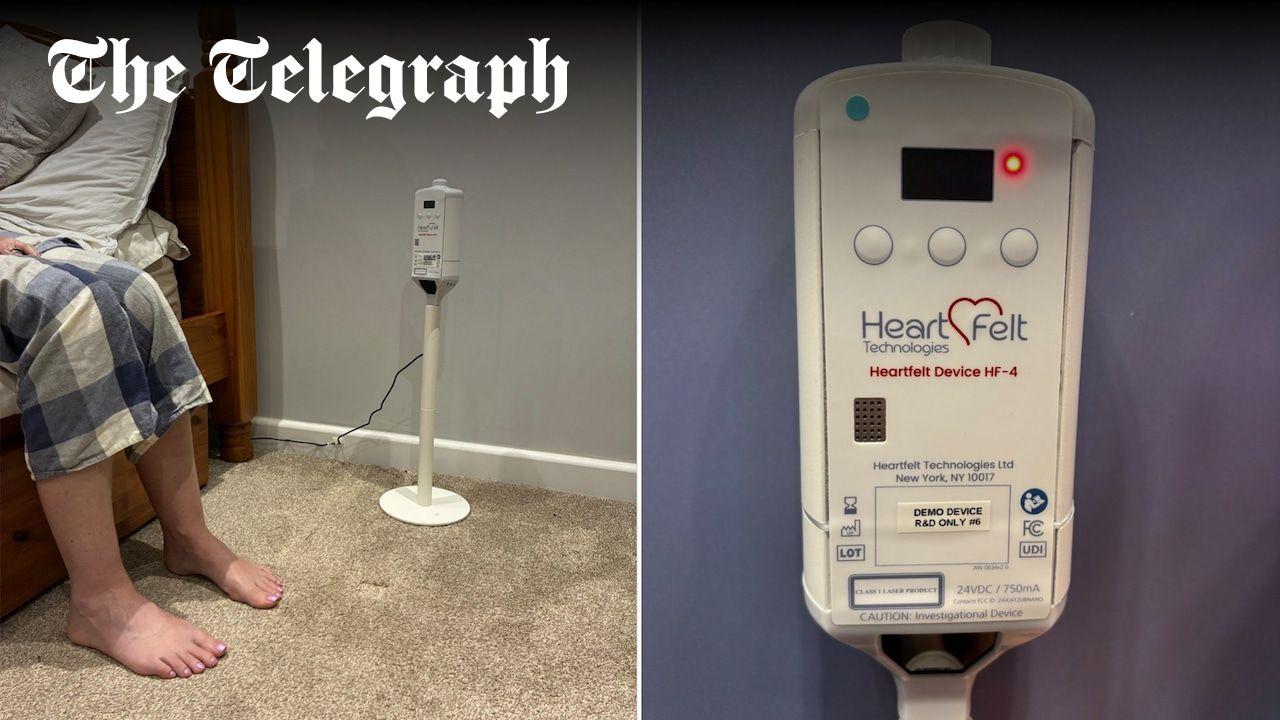AI-Powered Foot Scanner Detects Early Signs of Heart Failure, Potentially Reducing Hospital Admissions
2 Sources
2 Sources
[1]
At-home foot scanner detects warning signs of heart failure
Daily foot and leg scans can predict heart failure almost two weeks in advance, an NHS trial has suggested. The at-home scanner, which is the size of a smart speaker, is attached to a wall and automatically collects images of a patient's ankles and legs each day to monitor swelling. The device uses artificial intelligence to monitor changes by taking almost 2,000 photos a minute in order to analyse the level of fluid in the feet and ankles. This water retention is known as oedema and is one of the three major warning signs that heart failure is becoming severe and could be fatal.
[2]
AI foot scanner recognises warning signs of heart failure to keep people out of hospital, researchers say
The device takes and analyses almost 2,000 pictures a minute, in a similar manner to facial recognition, to calculate the level of fluid in the feet and ankles. A foot scanner that uses AI to recognise the warning signs of heart failure could be used at home to keep people out of hospital, researchers have said. The device takes and analyses almost 2,000 pictures a minute, in a similar manner to facial recognition, to calculate the level of fluid in the feet and ankles. Such water retention, known as oedema, is one of three major warning signs heart failure is becoming more severe and potentially life threatening. The AI scanner is roughly the size of a smart speaker and can alert healthcare professionals so they can take action, such as increasing the patient's medication. The device, developed by Cambridge-based start-up Heartfelt Technologies, is mounted to the wall and typically installed at a patient's bedside. It automatically takes 1,800 pictures a minute of the foot and lower leg and multiple angles, only scanning the legs to a height of 50cm off the floor, and then uses AI to calculate the level of fluid they contain. It also works without wifi. The Foot Study, which is being presented at the British Cardiovascular Society annual conference in Manchester, suggests the alerts come 13 days before a person would end up in hospital. It used the AI device to monitor 26 heart failure patients from five NHS trusts who were enrolled between 2020 and 2022 and asked them to weigh themselves using Bluetooth-enabled scales. Seven instances of worsening heart failure were detected in six patients, while one death from the condition was recorded. Researchers found in patients enrolled in the study for at least two weeks before an alert was triggered, the average lead time before hospital admission was 13 days. The lead time averaged eight days when all five triggers picked up by the device were analysed. The study also found monitoring using scales failed to predict any heart failure-related hospital admissions, with researchers suggesting this was because patients struggled to stick to tracking their weight, whereas the AI device did not require any action. The early warning provided by the device could allow specialist staff to react quickly to changes in a patient's condition, potentially allowing them to stay out of hospital. Dr Philip Keeling, senior author of the study and a consultant cardiologist at Torbay and South Devon NHS Foundation Trust, said: "Only about half of people admitted to hospital with heart failure currently get assigned an early review by a heart failure nurse who can check to see if they are suffering a harmful build-up of fluid because their heart is not working properly. "Amid a shortage of heart failure nurses, a device like this can be like a virtual nurse, tracking people's health." Heart failure is a long-term condition where the heart is unable to pump blood around the body properly, typically because it has become too weak or stiff, and is estimated to affect 920,000 people in the UK. The three main symptoms indicating the condition is getting worse are increased breathlessness, weight gain and swelling in the legs or ankles. Discussing the findings, Professor Bryan Williams, chief scientific and medical officer at the British Heart Foundation (BHF), said: "This small study suggests a simple device could significantly improve outcomes for at-risk patients with heart failure by keeping them out of hospital. "This study is a good example of how technology might aid earlier interventions and treatment, by allowing people to track a key sign of their heart health at home."
Share
Share
Copy Link
An AI-driven foot scanner, developed by Heartfelt Technologies, shows promise in detecting warning signs of heart failure up to two weeks in advance, potentially reducing hospital admissions and improving patient care.
AI-Powered Foot Scanner: A Breakthrough in Heart Failure Detection
A groundbreaking AI-powered foot scanner has shown promising results in detecting early warning signs of heart failure, potentially reducing hospital admissions and improving patient care. The device, developed by Cambridge-based startup Heartfelt Technologies, uses advanced artificial intelligence to monitor changes in fluid retention in patients' feet and ankles
1
.How the Device Works

Source: Sky News
The AI scanner, roughly the size of a smart speaker, is designed for at-home use and is typically mounted on a wall near the patient's bedside. It automatically captures and analyzes nearly 2,000 images per minute of the patient's feet and lower legs, focusing on the area up to 50cm off the floor
2
.Using AI algorithms similar to facial recognition technology, the device calculates the level of fluid in the feet and ankles. This water retention, known as oedema, is one of the three major warning signs that heart failure is becoming more severe and potentially life-threatening
1
.The Foot Study: Promising Results
The effectiveness of the AI scanner was evaluated in a study called "The Foot Study," which was presented at the British Cardiovascular Society annual conference in Manchester. The study monitored 26 heart failure patients from five NHS trusts between 2020 and 2022
2
.Key findings from the study include:
- The AI device detected seven instances of worsening heart failure in six patients.
- For patients enrolled in the study for at least two weeks, the average lead time before hospital admission was 13 days.
- When analyzing all five triggers picked up by the device, the average lead time was eight days.
- Traditional monitoring using scales failed to predict any heart failure-related hospital admissions.
Related Stories
Potential Impact on Patient Care
Dr. Philip Keeling, senior author of the study and consultant cardiologist at Torbay and South Devon NHS Foundation Trust, highlighted the device's potential to act as a "virtual nurse" in the face of healthcare staff shortages. The early warning provided by the scanner could allow specialist staff to react quickly to changes in a patient's condition, potentially keeping them out of the hospital
2
.Professor Bryan Williams, chief scientific and medical officer at the British Heart Foundation (BHF), emphasized the potential of this technology to improve outcomes for at-risk patients with heart failure by facilitating earlier interventions and treatment
2
.The Broader Context of Heart Failure

Source: The Telegraph
Heart failure is a long-term condition affecting an estimated 920,000 people in the UK. It occurs when the heart is unable to pump blood around the body properly, typically due to weakness or stiffness. The three main symptoms indicating worsening condition are increased breathlessness, weight gain, and swelling in the legs or ankles
2
.As this AI-powered foot scanner continues to show promise, it represents a significant step forward in the use of technology for early detection and management of heart failure, potentially improving patient outcomes and reducing the burden on healthcare systems.
References
Summarized by
Navi
[1]
Related Stories
Recent Highlights
1
ByteDance Faces Hollywood Backlash After Seedance 2.0 Creates Unauthorized Celebrity Deepfakes
Technology

2
Microsoft AI chief predicts artificial intelligence will automate most white-collar jobs in 18 months
Business and Economy

3
Google reports state-sponsored hackers exploit Gemini AI across all stages of cyberattacks
Technology








